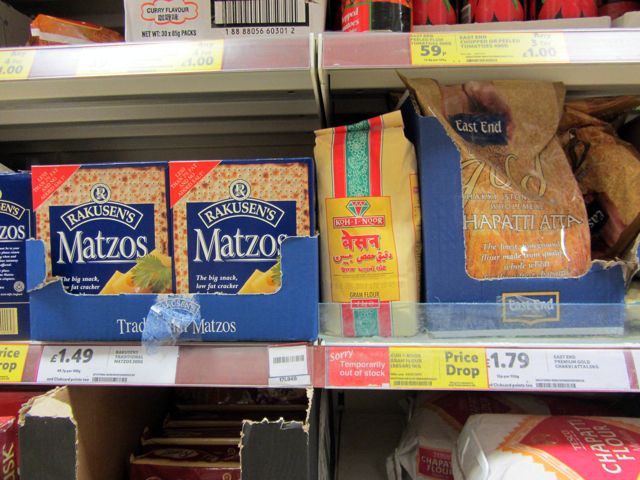The Imam was optimistic. ”This is a step forward for integration too’,” he bragged to ANSA, the Italian state news agency. The reason? The first halal mozzarella had been certified by religious authorities. Henceforth, Italian Muslims would be able to consume one of Italy’s most popular food products, in full accordance with their religious beliefs.
The company making the cheese – La Baronia, one of Italy’s biggest mozzarella producers – was equally pleased with the results. According to the state news agency, the firm was “opening the door to a massive market,” while setting an example for other companies to follow, creating ritually prescribed food products for Italy’s estimated 1.5 million Muslims.
Everyone was a winner here: Italy’s growing Muslim population, not to mention the business sector. One need only look north to France to understand the opportunity. With halal food sales estimated as high as 13 billion dollars annually, it’s an undeniably attractive market to grow. Granted, boasting five million Muslims to serve, the French market would be big. Considering its substantially smaller potential customer base, Italy can’t compete. Still, you have to start somewhere. A million and a half potential halal mozzarella buyers is hardly insignificant.
The idea that Italy would develop its own halal food market shouldn’t be surprising. A destination for mass immigration from Islamic regions since the early 1980s (the Balkans, North Africa, and South Asia primarily) the southern European state’s population is slowly coming to resemble that of other EU countries with older, more established Muslim communities. It was only a matter of time before immigrant-oriented businesses common abroad would follow. That their emergence would signal a deepening integration of Muslims in Italy is obvious.
Market-driven multiculturalism is often the most common way to promote tolerance, especially when governments are slow or hostile towards accommodating newcomers. Monetizing diversity will eventually exert its influence on public attitudes towards minorities, and, eventually, influence state policies, or so the logic goes. The magic formula, of course, is the idea that minorities are consumers, just like anyone else. If their religious requirements can help grow the economy, irrational prejudices against them will eventually be eroded.
That’s not the same thing as acceptance, though. It just means that minority identities are not in considered in active conflict with the dominant national cultures of their homes. So ubiquitous has their culture become, that their presence is deemed part of the local fabric. Hence, going out for a doner, or a plate of couscous is considered routine, not exotic. That their ingredients are prepared in accordance with religious laws, in addition to being certified by government food inspectors, is, hopefully, beside the point.
What happens, however when such models of integration can’t guarantee tolerance? Is it possible that, despite the economic benefits, and the cultural mixing (Greek and Turkish foods, for example, in German supermarkets) multiculturalism isn’t enough of an argument against racism to discourage discrimination? Recent events in both France, as well as the Netherlands, revolving specifically around ritually-prescribed foods, bear this possibility out. The Dutch example is perhaps the most instructive.
In June 2011, a law banning most forms of ritual slaughter was passed by Holland’s parliament. Originally introduced by a small animal rights party (the appropriately-named “Party for the Animals“) the legislation was aimed at protecting livestock from unnecessary harm. “I think the legal sphere still has to get used to the idea that the welfare of animals sometimes limit freedom of religion,” its leader, Marianne Thieme, told The National. Unsurprisingly, Holland’s Jewish and Muslim communities were alarmed.

The new legislation imposed state-mandated limits on ritual slaughter practices common to both Muslim and Jewish dietary laws. Contrary to ritual practice, animals would have to be stunned before being killed. With good reason, religious critics of the legislation criticized it for playing into the hands of anti-immigrant political parties, such as Geert Wilders’ Islamophobic PPV, which enthusiastically campaigned for its passage. Outlaw something as fundamental as these laws, and you open the door to state discrimination against Muslims and Jews.
By July 2012, the law was repealed by Holland’s senate. However, not before the theme was picked up in the French general elections in March, by then-incumbent Nicolas Sarkozy’s campaign (which in turn appropriated the halal meme from France’s PPV-equivalent, the Marine Le Pen-led National Front party) which proposed that ritually slaughtered meat products be labelled (to warn potentially offended consumers) and that Jews and Muslims consider dropping their dietary laws altogether. That’s a far cry from the original Dutch proposal. However, the continuity between the proposals is painfully clear.
At the heart of the Party for the Animals legislation is a criticism of religious attitudes towards animals, and what they say about the people who believe in them. Shechitah and Halal reflect primitive ideas about the subordination of animal to human welfare. As such, they are committed to a hierarchy that places animal life second, after human life. Though not extraordinary in terms of animal rights thinking, when read in context, it imbues a parallel hierarchy between minorities and Europeans. That, in large part, is what helped draw Geert Wilders to the legislation.
Muslims and Jews disregard the welfare of animals because their religions are primitive. Unable to empathize with animals, or to see them as equals, criticizing their ritual slaughter practices allows us to understand them for the who they really are, specifically foreigners. Never mind the fact that both religions have been practiced in Europe for a millennia, and that the banning of ritual slaughter has precedence in historic outbreaks of anti-Semitism. Adding Islamophobia to the mix can’t hide that. It only serves to erode the distinction between the two prejudices.
Most importantly, such criticisms help reminds us that the popularity of Middle Eastern foods is no guarantee against intolerance, even though it should be seen as a sign of diversity. If anything, the advent of rights-based arguments against ritual slaughter injects a certain tentativeness to such observations, by pointing out that ongoing efforts are being made to distinguish ‘Europeans’ from ‘Muslims’. Witness, for example, the support that the animal rights legislation received from left, as well as rightwing parties, in Holland, when it was first passed. The impulse isn’t marginal.
Looking to the market for signs of integration is no doubt helpful. After all, civil society is a space in which developing political attitudes can be gleaned from the way people trade with each other, and the products they sell. However, consumer choice is no guarantee of respect, regardless of the metaphors of pluralism it may give off. Particularly in times of economic crisis, when right-wingers seek out new ways of scapegoating minorities.
Sure enough, a month before the Dutch Senate voted down its anti-ritual slaughter legislation, a German judge in Cologne ruled that circumcision is ‘bodily harm.’ From here on out, Jewish and Muslim circumcision practices would be considered illegal, as they violate a child’s right to physical integrity. A child’s rights henceforth would supersede religious rights. Sound familiar?
Though it’s expected that Germany will eventually move to protect ritual circumcision, the persistence of such arguments is troubling. As long as minority cultural practices continue to be challenged by the invocation of local ‘rights’ – first animal rights, now human rights – the chances are Europeans will accumulate new rationales for racism. The challenge is to find effective ways to stop them. It’s time to expand our repertoire, and not assume that any of the models we’re used to invoking are binding.
One way to start that process is to ask ourselves what we mean when we use terms like ‘integration.’ Though the advent of halal mozzarella may indeed be a sign of such to Italian Muslims, it does not have the same immediate significance for non-minorities. Such distinctions are worth remembering.
Photographs courtesy of the author






You brilliantly illustrate how a controversy around religious dietary laws has roots in a repulsive strain of anti-Semitic and Islamophobic prejudice. But only some of the controversy’s roots find nourishment there. Others find it in a very Western tradition of animal rights that is expressed in behaviours such as vegetarianism and public support for recurrent, intensive campaigns against particularly egregious kinds of factory farming and slaughterhouse practices.
For people with these concerns, the ritual killing of animals without stunning is as reprehensible as all the other kinds of sufferings humans cause to animals. Theirs is not a racist concern, but one grounded in the ethics promulgated by, amongst others, Peter Singer.
The genius of the Wilders-FN brigade consists of finding points of pride for Western liberals and imply they are under threat by foreigners. A well-known example is provided by Wilders’ extraordinarily innovative use of the fear of a recrudescent homophobia (supposedly typically Muslim) to vault his racist party into a kingmaker role in the Dutch Parliament in 2010. Positioning his racism as grounded in the defence of liberal Dutch values was a perfect example of the rise of a modern “National (socialism)”.
Animal cruelty falls into the same category as homophobia. In theory, all Europeans are against it; in practice, not. Most Europeans have seen TV reports about the cruelty of factory farming and feel vaguely guilty about it, hence automatically support efforts to better regulate the trade. Implying that ritual slaughter is even worse than factory farming automatically raises a large army of animal-rights supporters who want it banned – and who, since they are not subject to the relevant dietary laws, will pay no personal price for the banishment of this “cruel practice”.
The tactic’s effectiveness is rooted in psychology. The mass of European citizens are neither openly homophobic nor subject to dietary laws, but many may feel pangs of unease at the sight of gay men kissing, or at the buying of a factory chicken. By encouraging them to associate these negative feelings with “foreigners”, National (socialists) give them a great way of sublimating them onto a new, external object: the Jew, the Muslim, the Foreigner. And since most people are, theoretically, in favour of animal rights, while in practice usually favoring the cheapest options in the supermarket aisles, those feelings need to be sublimated often.
These tactics are especially dangerous for the Left because they serve a purpose far grander than the “mere” election of rightist National (socialists) to Parliament: they effectively destroy the left by encouraging the rise of “(national) Socialists”.
By misusing the rights agenda, the right effectively severs the historical link between the left and antiracism. it is placed before a false choice: that between the rights of religious minorities and those of women, gays, animals etc. A growing number of socialists have thus seen fit to reinvent themselves as (national) Socialists.
The usual reaction of the targeted groups (muslims and jews) is to protest against the national socialists’ blatant misuse of the rights agenda. The tragedy is that while doing so, they often minimize the rights issues embedded in that misuse. Thus the right wins every time: all it has to do is say “see? i told you so. They are only concerned about their own (evil) habits, not about animals/gays/women”.
Fighting back against such tactics is hard. Hard, but not impossible. I suspect that any effective strategy to do so must include addressing legitimate rights-based concerns, even if they have been raised for dishonourable ends by dishonourable people.
That means that European Islam needs the odd gay emir, in the same way that jews have gay rabbis. Both communities need strong kasher / halal animal rights movements. Jews, and especially Muslims, must ensure that strong, vibrant Muslim and Jewish voices join other Europeans in defending the rights Europeans profess to hold dear.
Yes, this means fighting on the enemy’s turf. But I don’t see much choice. The rise of Islamophobia across Europe proves that the right’ tactics are psychologically brilliant. The Left’s must be, too.